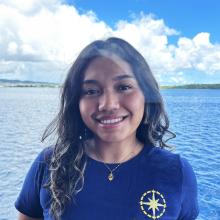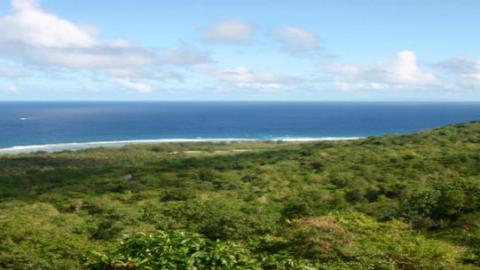
Mya Satomi Ngemaes
Tell us about your work/research. What kinds of things do you do?
I studied coral resilience to environmental stress, particularly rising sea temperatures, because understanding how corals respond to changing conditions can help predict their future survival. Corals rely on a delicate relationship with their symbiotic algae, and shifts in temperature can affect their photosynthetic efficiency, zooxanthellae density, and chlorophyll concentration. By analyzing these factors, I determined how different coral morphotypes and locations influenced their ability to withstand environmental stress.
What sparked your initial interest in your career?
I have always been fascinated by the ocean, but my interest in marine science deepened as I learned about the challenges facing coral reefs. Growing up Palauan, the ocean has always been an essential part of my culture, providing not only food and resources but also shaping our traditions and way of life. Seeing the impacts of climate change and human activity on these ecosystems made me want to understand how corals respond to environmental stress and what can be done to protect them.
My curiosity grew through hands-on experiences, from snorkeling and diving to participating in field research. I was especially drawn to studying coral physiology because it connects larger ecological patterns with the microscopic interactions that sustain reef health. Over time, my passion for marine biology evolved into a research focus on coral resilience, driven by a desire to contribute to conservation efforts—not only for the sake of science but also to help preserve the reefs that are so deeply intertwined with my cultural heritage.
Who influenced you or encouraged you the most?
My biggest influences have been my family and my cultural connection to the ocean. Growing up Palauan, I was surrounded by a deep respect for the sea, which has always been more than just a resource—it is a way of life. My family instilled in me the importance of protecting our reefs, and their stories about traditional fishing practices and marine stewardship inspired me to pursue marine science.
In addition to my family, my professors and mentors have played a crucial role in encouraging me. Their passion for marine biology and conservation showed me that scientific research could be a powerful tool for protecting the ecosystems I care about. Their guidance helped me navigate my studies, refine my research focus, and believe in my ability to contribute to coral reef conservation. Through their support, I’ve been able to turn my passion into meaningful work, bridging science with cultural heritage to better understand and protect coral reefs.
What element of your work/study do you think is the most fascinating?
The most fascinating part of my work is uncovering how corals respond to environmental stress at both the microscopic and ecosystem levels. Corals may look like simple organisms, but they have complex relationships with their symbiotic algae, which directly influence their survival. Analyzing changes in photosynthetic efficiency, zooxanthellae density, and chlorophyll concentration allows me to see how corals are adapting—or struggling—under changing conditions.
What makes this especially exciting is that these physiological responses vary across different reef environments. Corals from different areas can show unique resilience strategies, shaped by local environmental factors. Understanding these differences helps us predict how reefs may respond to future challenges, which is crucial for conservation efforts.
Beyond the science, I also find it fascinating how my research connects back to my cultural heritage. As a Palauan, I see coral reefs not just as ecosystems but as an integral part of my identity. Studying their resilience is not just about science—it’s about preserving a way of life.
How did you get involved with the Ocean Exploration Trust?
I applied to the Ocean Exploration Trust’s Science & Engineering Internship Program (SEIP) to gain hands-on experience in ocean exploration and research. With my background in marine science and coral resilience, I saw this as a great opportunity to expand my skills and contribute to deep-sea exploration.
What are your degrees and certifications?
B.S. Integrative Biology (current)
BLS
Basic Oxygen Provider
What are your hobbies?
Outside of my studies and research, I enjoy snorkeling and diving, which allow me to connect with the marine environments I’m passionate about. I also love outdoor activities like hiking, riding motocross, and wakeboarding!
What advice would you give someone who wants to have a career like yours?
My advice for anyone interested in a career in marine science is to stay curious and seek out hands-on experiences whenever possible. Fieldwork, lab research, internships, and volunteer opportunities can provide valuable skills and help you discover what aspects of marine science excite you the most.
Networking is also important—connecting with professors, researchers, and professionals in the field can open doors to new opportunities and mentorship. Don’t be afraid to ask questions or reach out to people whose work inspires you.
Finally, be persistent. Marine science can be a challenging field, but if you’re passionate about the ocean, the work is incredibly rewarding. Stay open to learning, be adaptable, and remember that every experience—whether in the classroom, the lab, or the field—brings you one step closer to your goals.
Expeditions
Mya Satomi participated in the following Ocean Exploration Trust expeditions:

